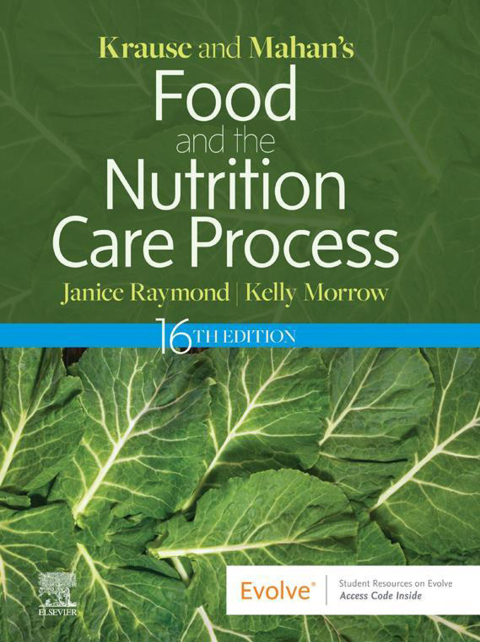Description
Efnisyfirlit
- Cover image
- Title page
- Table of Contents
- Dietary Reference Intakes (DRIs)
- Copyright
- Dedication
- Contributors
- Foreword
- Preface
- Audience
- Organization
- New to this Edition
- Pedagogy
- Ancillaries
- Instructor Resources
- Student Resources
- Acknowledgments
- Part I. Nutrition Assessment
- 1. Intake: Gastrointestinal Digestion, Absorption, and Excretion of Nutrients*
- Key Terms
- The Gastrointestinal Tract
- Brief Overview of Digestive and Absorptive Processes
- The Small Intestine: Primary Site of Nutrient Absorption
- The Large Intestine
- Summary
- Useful Websites
- References
- 2. Intake: Energy
- Key Terms
- Energy Requirements
- Components of Energy Expenditure
- Estimating Energy Requirements
- Physical Activity in Children
- Calculating Food Energy
- Useful Websites/Apps
- References
- 3. Clinical: Water, Electrolytes, and Acid–Base Balance
- Key terms
- Body Water
- Electrolytes
- Acid–Base Balance
- Acid Generation
- Acid–Base Disorders
- References
- 4. Intake: Assessment of Food- and Nutrition-Related History
- Key Terms
- Nutritional Status
- Nutrition Screening
- Nutrition Assessment
- Nutrition-Related History
- Food and Nutrient Intake
- Food and Nutrient Administration
- Nutrition Knowledge, Beliefs, and Attitudes
- Nutrition Behaviors
- Medication and Complementary or Alternative Medicines
- Nutrition Access
- Physical Activity and Physical Function
- Nutrition Quality of Life
- References
- 5. Clinical: Biochemical, Physical, and Functional Assessment
- Key Terms
- Biochemical Assessment of Nutrition Status
- Nutrition Interpretation of Routine Medical Laboratory Tests
- Assessment of Hydration Status
- Assessment for Nutritional Anemias
- Fat-Soluble Vitamins
- Water-Soluble Vitamins and Trace Minerals
- Chronic Disease Risk Assessment
- Physical Assessments
- Nutrition-Focused Physical Examination
- Useful Websites
- References
- 6. Clinical: Nutritional Genomics
- Key Terms
- Genetic and Genomic Fundamentals
- Modes of Inheritance
- Genetic Variation, Inheritance, and Disease
- Nutritional Genomics and Chronic Disease
- Summary
- Useful Websites
- References
- 7. Inflammation and the Pathophysiology of Chronic Disease
- Key Terms
- Epidemic of Chronic Disease
- Concepts of Chronic Disease Pathophysiology
- Inflammation: Common Denominator of Chronic Disease
- Nutrient Modulators of Inflammation
- Reducing Inflammation in the Body
- Summary
- Useful Websites
- References
- 8. Behavioral-Environmental: The Individual in the Community
- Key Terms
- Social Determinants of Health
- Nutrition Practice in the Community
- Needs Assessment for Community-Based Nutrition Services
- National Nutrition Surveys
- National Nutrition Guidelines and Goals
- Food Assistance and Nutrition Programs
- Foodborne Illness
- Food and Water Safety
- Disaster Planning
- Healthy Food and Water Systems and Sustainability
- Summary: A Work in Progress
- Useful Websites
- References
- PART II. Nutrition Diagnosis and Intervention
- 9. Overview of Nutrition Diagnosis and Intervention
- Key Terms
- The Nutrition Care Process
- Documentation in the Nutrition Care Record
- Influences on Nutrition and Health Care
- Nutrition Interventions
- Nutrition for the Terminally Ill or Hospice Client
- Useful Websites
- References
- 10. Food-Nutrient Delivery: Planning the Diet With Cultural Competency
- Key Terms
- Determining Nutrient Needs
- Worldwide Guidelines
- Nutritional Status of Americans
- National Guidelines for Diet Planning
- Food and Nutrient Labeling
- Dietary Patterns and Counseling Tips
- Cultural Aspects of Dietary Planning
- Useful Websites
- References
- 11. Food and Nutrient Delivery: Complementary and Integrative Medicine and Dietary Supplements
- Key Terms
- Complementary and Integrative Medicine
- Use of Complementary and Integrative Therapies
- Dietary Supplementation
- Dietary Supplement Regulation
- Assessment of Dietary Supplement Use in Patients
- Useful Websites
- References
- 12. Food and Nutrient Delivery: Nutrition Support Methods
- Key Terms
- Rationale and Criteria for Appropriate Nutrition Support
- Enteral Nutrition
- Enteral Nutrition Access
- Parenteral Nutrition
- Complications
- Refeeding Syndrome
- Transitional Feeding
- Nutrition Support in Long-Term and Home Care
- Useful Websites
- References
- 13. Education and Counseling: Behavioral Change
- Key Terms
- Behavior Change
- Models for Behavior Change
- Models For Counseling Strategies
- Models for Educational Program Development
- Skills and Attributes of the Nutrition Educator or Counselor
- Assessment Results: Choosing Focus Areas
- Counseling Approaches After the Assessment
- Evaluation of Effectiveness
- Summary
- Useful Websites
- References
- Part III. Nutrition in the Life Cycle
- 14. Nutrition in Pregnancy and Lactation
- Key Terms
- Preconception and Fertility
- Conception
- Pregnancy
- Postpartum Period = Preconceptual Period
- Lactation
- Useful Websites
- References
- 15. Nutrition in Infancy
- Key Terms
- Physiologic Development
- Nutrient Requirements
- Milk
- Food
- Feeding
- Useful Websites
- References
- 16. Nutrition in Childhood
- Key Terms
- Growth and Development
- Nutrient Requirements
- Providing an Adequate Diet
- Nutritional Concerns
- Preventing Chronic Disease
- Useful Websites
- References
- 17. Nutrition in Adolescence
- Key Terms
- Growth and Development
- Nutrient Requirements
- Food Habits and Eating Behaviors
- Nutrition Screening, Assessment, and Counseling
- Special Topics
- Useful Websites
- References
- 18. Nutrition for Transgender People
- Key Terms
- Aspects of Transitioning
- Health Disparities
- Challenges to Providing Optimal Gender-Affirming Nutrition Care
- Common Nutrition-Related Considerations
- Nutritionally Relevant Effects of Gender-Affirming Interventions
- Approaches to Nutrition Care
- Additional Resources
- References
- 19. Nutrition in the Adult Years
- Key Terms
- Setting the Stage: Nutrition in the Adult Years
- Setting the Stage: Messages
- Information Sources
- Lifestyle and Health Risk Factors
- Health Disparities and Global Health
- Nutritional Factors Affecting Adults
- Interventions, Nutrition, and Prevention
- Food Trends and Patterns
- Nutritional Supplementation
- Functional Foods
- Adult Health Next Steps
- Useful Websites
- References
- 20. Nutrition in Aging
- Key Terms
- The Older Population
- Gerontology, Geriatrics, and the Spectrum of Aging
- Nutrition in Health Promotion and Disease Prevention
- Theories on Aging
- Physiologic Changes
- Quality of Life
- Nutrition Screening and Assessment
- Nutrition Needs
- Medicare Benefits
- Nutrition Support Services
- Community and Residential Facilities for Older Adults
- Useful Websites
- References
- Part IV. Nutrition for a Healthy Lifestyle
- 21. Nutrition in Weight Management
- Key Terms
- Weight Management and Obesity: Its Foundation in Nutritional Medicine
- Body Weight Components
- Regulation of Body Weight
- Overweight and Obesity
- Elements of Energy Balance Dysregulation
- Management of Obesity in Adults
- Weight Management in Children and Adolescents
- Excessive Leanness or Unintentional Weight Loss
- Useful Websites
- References
- 22. Nutrition in Eating Disorders
- Key Terms
- Clinical Characteristics and Medical Complications
- Treatment Approach
- Psychologic Management
- Nutrition Management
- Medical Nutrition Therapy and Counseling
- Summary
- Useful Websites
- References
- 23. Nutrition in Exercise and Sports Performance
- Key Terms
- Bioenergetics of Physical Activity
- Fuels for Contracting Muscles
- An Integrative Approach to Working with Athletes
- Nutritional Requirements of Exercise
- Weight Management
- Weight Management and Aesthetics
- Macronutrients
- Carbohydrate
- Protein
- FAT
- Fluid
- Vitamins and Minerals
- Minerals
- Ergogenic Aids
- Popular Ergogenic Aids
- Performance Enhancement Substances and Drugs: Doping in Sport
- Useful Websites
- References
- 24. Nutrition and Bone Health
- Key Terms
- Introduction
- Bone Structure and Bone Physiology
- Osteopenia and Osteoporosis
- Nutrition and Bone
- Treatment of Osteoporosis
- References
- 25. Nutrition for Oral and Dental Health
- Key Terms
- Nutrition for Tooth Development
- Dental Caries
- Early Childhood Caries
- Caries Prevention
- Tooth Loss and Dentures
- Other Oral Disorders
- Periodontal Disease
- Oral Manifestations of Systemic Disease
- Useful Websites
- References
- Part V. Medical Nutrition Therapy
- 26. Medical Nutrition Therapy for Adverse Reactions to Food: Allergies and Intolerances
- Key Terms
- Definitions
- Prevalence:
- Etiology
- Pathophysiology of Food Allergy
- Immune System Basics
- Food-Dependent, Exercise-Induced Anaphylaxis
- Food Intolerances
- Medical Nutrition Therapy
- Diagnosis
- Intervention
- Monitoring and Evaluation
- Prevention of Food Allergies
- Useful Websites
- References
- 27. Medical Nutrition Therapy for Upper Gastrointestinal Tract Disorders
- Key Terms
- The Esophagus
- The Stomach
- Gastroparesis
- Useful Websites
- References
- 28. Medical Nutrition Therapy for Lower Gastrointestinal Tract Disorders
- Key Terms
- Common Intestinal Problems
- Diseases of the Small Intestine
- Intestinal Brush-Border Enzyme Deficiencies
- Inflammatory Bowel Disease
- Nutritional Consequences of Intestinal Surgery
- Useful Websites
- References
- 29. Medical Nutrition Therapy for Hepatobiliary and Pancreatic Disorders
- Key Terms
- Physiology and Functions of the Liver
- Diseases of the Liver
- Complications of End-Stage Liver Disease: Cause and Nutrition Treatment
- Nutrition Issues Related to End-Stage Liver Disease
- Nutrient Requirements for Cirrhosis
- Herbal and Dietary Supplements and Liver Disease
- Liver Resection and Transplantation
- Physiology and Functions of the Gallbladder
- Diseases of the Gallbladder
- Complementary and Integrative Medicine for Gallstones
- Physiology and Functions of the Exocrine Pancreas
- Diseases of the Exocrine Pancreas
- Complementary and Integrative Medicine for Pancreatic Disorders
- Pancreatic Surgery
- Useful Websites
- References
- 30. Medical Nutrition Therapy for Diabetes Mellitus and Hypoglycemia of Nondiabetic Origin
- Key Terms
- Incidence and Prevalence
- Categories of Glucose Intolerance
- Screening and Diagnostic Criteria
- Management of Prediabetes
- Management of Diabetes
- Implementing the Nutrition Care Process
- Acute Complications
- Long-Term Complications
- Hypoglycemia of Nondiabetic Origin
- Useful Websites
- References
- 31. Medical Nutrition Therapy for Thyroid, Adrenal, and Other Endocrine Disorders
- Key Terms
- Thyroid Physiology
- Assessment in Thyroid Disorders
- Hypothyroidism
- Polycystic Ovary Syndrome
- Hyperthyroidism
- Managing Imbalances of the Hypothalamus-Pituitary-Thyroid Axis
- Adrenal Disorders
- Useful Websites
- References
- 32. Medical Nutrition Therapy for Anemia
- Key Terms
- Iron-Related Blood Disorders
- Iron Overload
- Megaloblastic Anemias
- Other Nutritional Anemias
- Nonnutritional Anemias
- Useful Websites
- References
- 33. Medical Nutrition Therapy for Cardiovascular Disease
- Key Terms
- Atherosclerosis and Coronary Heart Disease
- Genetic Hyperlipidemias
- Hypertension
- Heart Failure
- COVID-19
- Cardiac Transplantation
- Useful Websites
- References
- 34. Medical Nutrition Therapy for Pulmonary Disease
- Key Terms
- The Pulmonary System
- Chronic Pulmonary Disease
- Asthma
- Chronic Obstructive Pulmonary Disease
- Pulmonary Hypertension
- Diffuse Parenchymal Lung Disease
- Tuberculosis
- Lung Cancer
- Obesity Hypoventilation Syndrome
- Pleural Effusion
- Chylothorax
- Acute Respiratory Distress Syndrome
- Pneumonia
- Lung Transplantation
- Bronchopulmonary Dysplasia
- Useful Websites
- References
- 35. Medical Therapy for Renal Disorders
- Key Terms
- Physiology and Function of the Kidneys
- Renal Diseases
- Education, Adherence, and Compliance
- Acute Kidney Injury (Acute Renal Failure)
- Chronic Kidney Disease
- End-Stage Renal Disease
- References
- 36. Medical Nutrition Therapy for Cancer Prevention, Treatment, and Survivorship
- Key Terms
- Pathophysiology
- Nutrition and Carcinogenesis
- Chemoprevention
- Medical Diagnosis and Staging of Cancer
- Medical Treatment
- Medical Nutrition Therapy
- Integrative, Complementary, and Functional Oncology
- Nutritional Impact of Cancer Treatments
- Nutrition Monitoring and Evaluation
- Pediatric Cancer
- Nutrition Recommendations for Cancer Survivors
- Useful Websites
- References
- 37. Medical Nutrition Therapy for Infectious Diseases
- Key Terms
- Introduction
- Definitions
- The Immune System and Response to Infection
- Synergy of Malnutrition and Infection
- Effects of Nutrition on the Immune System and Infection
- Micronutrient Deficiencies, Immunity, and Infection
- Impact of Infectious Disease on Nutrition and the Immune System
- The Major Infectious Diseases and Their Impacts
- Summary
- Clinical Case Study
- References
- 38. Medical Nutrition Therapy for HIV and AIDS
- Key Terms
- The Changing Face of HIV in the United States
- Epidemiology and Trends
- Pathophysiology and Classification
- Medical Management
- Medical Nutrition Therapy
- HIV in Women
- HIV in Children
- Integrative and Functional Nutrition
- Useful Websites
- References
- 39. Medical Nutrition Therapy in Critical Care
- Key Terms
- Metabolic Response to Stress
- Hormonal and Cell-Mediated Response
- Starvation Versus Stress
- Systemic Inflammatory Response Syndrome, Sepsis, and Organ Dysfunction or Failure
- Malnutrition: The Etiology-Based Definition
- Trauma and the Open Abdomen
- Major Burns
- Surgery
- Useful Websites
- References
- 40. Medical Nutrition Therapy for Rheumatic and Musculoskeletal Disease
- Key Terms
- Etiology
- Pathophysiology and Inflammation
- Medical Diagnosis and Treatment
- Pharmacotherapy
- Antiinflammatory Diet
- Complementary and Integrative Health Approaches
- Microbiota and Arthritis
- COVID-19 and Rheumatic Disease
- Osteoarthritis
- Rheumatoid Arthritis
- Sjögren Syndrome
- Temporomandibular Disorders
- Gout
- Scleroderma (Systemic Sclerosis or SSc)
- Systemic Lupus Erythematosus
- Spondyloarthritides
- Useful Websites
- References
- 41. Medical Nutrition Therapy for Neurologic Disorders
- Key Terms
- The Nervous System
- Dysphagia
- Neurologic Diseases of Nutritional Origin
- Neurologic Disorders from Trauma
- Head Trauma or Neurotrauma
- Spine Trauma and Spinal Cord Injury
- Neurologic Diseases
- Useful Websites
- References
- 42. Medical Nutrition Therapy for Psychiatric and Cognitive Disorders
- Key Terms
- The Enteric Nervous System
- Blood Glucose Regulation
- The Role of Nutrients in Mental Function
- Addiction and Substance Abuse
- Anxiety
- Bipolar Disorder
- Dementia and Alzheimer Disease
- Depression
- Fatigue, Chronic Fatigue Syndrome, and Fibromyalgia Syndrome
- Schizophrenia
- Useful Websites
- References
- Part VI. Pediatric Specialties
- 43. Medical Nutrition Therapy for Low-Birth Weight Infants
- Key Terms
- Infant Mortality and Statistics
- Physiologic Development
- Nutrition Requirements: Parenteral Feeding
- Transition from Parenteral to Enteral Feeding
- Nutrition Requirements: Enteral Feeding
- Feeding Methods
- Selection of Enteral Feeding
- Nutrition Assessment and Growth
- Discharge Care
- Neurodevelopmental Outcome
- Useful Websites
- References
- 44. Medical Nutrition Therapy for Genetic Metabolic Disorders
- Key Terms
- Newborn Screening
- Disorders of Amino Acid Metabolism
- Phenylketonuria
- Disorders of Organic Acid Metabolism
- Disorders of Urea Cycle Metabolism
- Disorders of Carbohydrate Metabolism
- Disorders of Fatty Acid Oxidation
- Role of the Nutritionist in Genetic Metabolic Disorders
- Useful Websites
- References
- 45. Medical Nutrition Therapy for Intellectual and Developmental Disabilities
- Key Terms
- Medical Nutrition Therapy
- Chromosomal Abnormalities
- Neurologic Disorders
- Fetal Alcohol Syndrome
- Community Resources
- Useful Websites
- References
- APPENDIX 1. Milliequivalents and Milligrams of Electrolytes
- APPENDIX 2. Equivalents, Conversions, and Portion (Scoop) Sizes
- Liquid Measure—Volume Equivalents
- Dry Measure
- Scoop Sizes
- Appendix 3. Growth Charts
- Prenatal Weight Category Table for Pregnancy Based on BMI (inches and pounds)
- Prenatal Weight Category Table for Pregnancy Based on BMI (centimeters and kilograms)
- APPENDIX 4. Tanner Stages of Adolescent Development for Girls and Boys
- Tanner Stages of Adolescent Development for Girls
- Tanner Stages of Adolescent Development for Boys
- Appendix 5. Direct Methods for Measuring Height and Weight and Indirect Methods for Measuring Height
- Direct Methods for Measuring Height and Weight
- Indirect Methods for Measuring Height
- References
- Appendix 6. Determination of Frame Size
- Appendix. Adjustment of Desirable Body Weight for Amputees
- Appendix 8. Body Mass Index Table
- Appendix 9. Percentage of Body Fat Based on Four Skinfold Measurements
- Appendix 10. Physical Activity and Calories Expended Per Hour
- Appendix 11. Nutrition-Focused Physical Assessment
- Pediatric Malnutrition
- References
- Appendix 12. Laboratory Values for Nutritional Assessment and Monitoring
- Principles of nutritional laboratory testing Principles of nutritional laboratory testing
- Appendix 13. Nutritional Implications of Selected Drugs
- References
- Appendix 14. Nutritional Facts on Fluid and Hydration
- Appendix 15. Enteral (Tube Feeding) Formulas for Adults Marketed in the United States
- Appendix 16. Sample Stepwise Method to Calculate a Parenteral Nutrition Formula
- Parenteral Nutrition Formula
- Appendix 17. Dietary Approaches to Stop Hypertension Diet
- Appendix 18. Exchange Lists and Carbohydrate Counting for Meal Planning
- How the Exchange List Works with Meal Planning
- Carbohydrates
- Fruit
- Milk
- Sweets, Desserts, and Other Carbohydrates
- Nonstarchy Vegetables
- Meat And Meat Substitutes
- Fats
- Free Foods
- Combination Foods
- Fast Food
- Alcohol
- Estimated Exchange Recommendations Based on Calorie Level
- References
- Appendix 19. The Ketogenic Diet
- Suggested Organizations for Additional Information
- Appendix 20. The International Dysphagia Diet Standardisation Initiative
- Introduction and Background
- Development
- Framework
- Websites Recommended for Additional Research
- Appendix 21. Renal Diet for Dialysis
- Protein
- Albumin
- Protein Servings for You
- One Serving of Protein
- Common Serving Sizes
- Estimating Serving Sizes
- Tips for Eating More Protein
- Nutritional Supplements
- Malnutrition
- Exercise
- Potassium for People on Hemodialysis
- People on Hemodialysis
- Soaking Vegetables and Beans
- Other High-Potassium Foods
- Shaking the Salt Habit
- Most People on Dialysis May Have
- Rinsing Canned Foods to Lower Sodium (Canned Vegetables, Chunk or Flaked Fish or Shellfish, Poultry, or Meats)
- Phosphorus
- Appendix 22. The Antiinflammatory Diet
- Dietary Approaches to Reduce Inflammation
- Consume an Abundance of Fruits, Vegetables, Herbs, and Spices
- Encourage a Low Glycemic Diet Pattern
- Include Nuts and Seeds or Nut and Seed Butter Every Day
- Adjust the Quality and Quantity of Dietary Fat and Oils
- Support a Healthy Microbiome
- Eliminate Foods that Cause Symptoms of Allergy and Intolerance
- Avoid Chemicals
- Drink Alcohol in Moderation
- Calorie Restriction and Intermittent Fasting
- Reduce Stress and Improve Sleep
- Example of an Anti inflammatory 1-Day Diet Based on the Dash, Mind, and Mediterranean Meal Patterns
- Appendix 23. The Mediterranean Diet
- Significance
- Examples of a 1-Day Meal Plan Based on the Mediterranean Diet
- Information for Further Reading
- Appendix 24. Nutritional Facts on Alcoholic Beverages
- Alcohol and Calorie Content in Selected Alcoholic Beverages
- Appendix 25. Nutritional Facts on Caffeine-Containing Products
- Appendix 26. Nutritional Facts on Essential (Omega) Fatty Acids
- Ω-3 Fatty Acids
- Ω-6 Fatty Acids
- Dietary Sources
- Omega-3 Fatty Acids
- Appendix 27. Nutritional Facts on a High-Fiber Diet
- Guidelines for High-Fiber Diet
- Each of These Foods in this Amount Contains 2 G of Dietary Fiber
- Appendix 28. Low FODMAP Diet
- Appendix 29. Glycemic Index and Glycemic Load of Selected Foods*
- Appendix 30. Nutritional Facts on a High-Protein Diet
- Best Food Sources of Protein
- Protein Supplements
- Appendix 31. Nutritional Facts on Vegetarian Eating
- Nutrients to Consider When Planning a Vegetarian Menu
- Special Notes
- Appendix 32. Nutritional Facts on Folic Acid, Vitamin B6, and Vitamin B12
- Folate
- VITAMIN B6
- Vitamin B12
- References
- Appendix 33. Nutritional Facts on Choline
- Groups with Increased Choline Needs
- Excessive Choline Intake
- References
- Appendix 34. Nutritional Facts on Biotin
- References
- Appendix 35. Nutritional Facts on Vitamin A and Carotenoids
- Food Sources of Vitamin A
- References
- Appendix 36. Nutritional Facts on Vitamin C
- References
- Appendix 37. Nutritional Facts on Vitamin E
- References
- Appendix 38. Nutritional Facts on Vitamin K
- References
- Appendix 39. Nutritional Facts on Vitamin D
- Vitamin D Synthesized From Sunlight Exposure
- Vitamin D in Foods
- Vitamin D in Supplements
- References
- Appendix 40. Nutritional Facts on Calcium
- Calcium in Foods
- Calcium Supplements
- Calcium in Medications
- References
- Appendix 41. Nutritional Facts on Chromium
- References
- Appendix 42. Nutritional Facts on Iodine
- Deficiency
- Goitrogens
- References
- Appendix 43. Nutritional Facts on Iron
- Tips for Increasing Iron Intake
- What about too much iron?
- References
- Appendix 44. Nutritional Facts on Magnesium
- Dietary Sources
- References
- Appendix 45. Nutritional Facts on Potassium
- References
- Appendix 46. Nutritional Facts on Selenium
- References
- Appendix 47. Sodium in Food
- Special Considerations
- Guidelines for Sodium Restriction
- References
- Appendix 48. Nutritional Facts on Zinc
- References
- Index
- Evolve Student Resources





